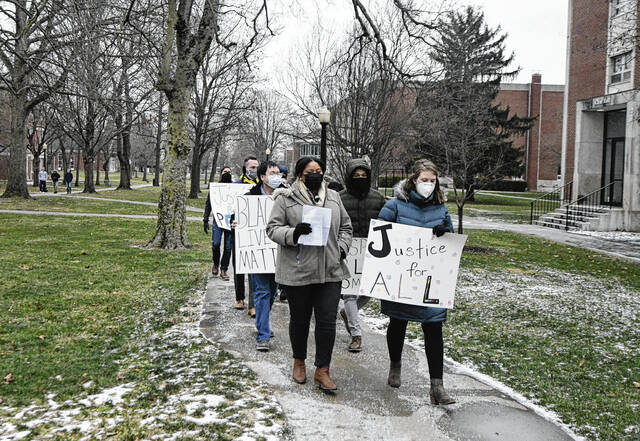It’s been almost 54 years since Dr. Martin Luther King Jr. was assassinated on the balcony of a Memphis motel, and more than half a century later, his message of striving for social justice and equity still holds weight.
Students registered to vote at Franklin College Monday, received pamphlets on national legislation to expand voting rights and heard a convocation lecture regarding the still-relevant lessons of King’s life.
The annual Dr. Martin Luther King Jr. Day also included a march of students and faculty members from B.F. Hamilton Library at the Indiana Alpha Gazebo to Richardson Chapel, where the convocation took place. During the march on the blistery January day, faculty members and students sang “We Shall Overcome” and “This Little Light of Mine,” spirituals that stood the test of time from slavery to the civil rights movement to the present day.
During the chapel service at Richardson Chapel, the choir sang “Lift Every Voice and Sing,” often referred to as the Black National Anthem, according to the National Association for the Advancement of Colored People.
Part of the importance of the day is realizing there is still much work to be done when it comes to building equity across racial lines, said Maegan Pollonais, director of Franklin College’s Center for Diversity and Inclusion.
“A lot of times people think of (King) as someone who was just this pro-integration, colorblind person who just wanted us to be together in spite of all these things, but that’s incorrect,” Pollonais said. “I think he would be on the street with us marching for Black Lives Matter and discussing the lack of social justice some of us experience. It’s important to read all of what he said and not just cherry-pick quotes. He would be on the front lines wanting to march for us all. Whether it’s about Black lives or trans(gender) lives, it’s about incorporating justice for all.”
One of the most important issues facing Black Americans today is disenfranchisement in voting booths, and more than marching in protests, there is a need to organize and engage with lawmakers, said Dr. Shaun Harper, a diversity, equity and inclusion expert at the University of Southern California.
“Dr. King marched for voting rights and engaged with legislators and lawmakers in defense of the right to vote for everybody,” Harper said. “We must, as individual citizens and a collective, work as hard as we can, and skillfully and strategically as we can, to protect the right to vote. It’s one of the most consequential civil rights issues of 2022. If Martin Luther King was alive, I assure you he would be urging us to be on the front lines, urging us to defend the right to vote and fighting radicalized tactics to suppress the right to vote.”
In order to respect King’s legacy, it’s also important not to sugarcoat his message or misrepresent what he stood for. It’s also necessary for classrooms to include all aspects of history, he said.
“King was clear that all lives do matter, but he was also clear Black lives matter. It’s not an either/or,” Harper said. “He called consistently for the eradication of injustice against Black people. It doesn’t necessitate that we discriminate against other groups, but it’s clear Black suffering and disadvantages were a real centerpiece of his campaign. Stop people as they misappropriate judging people on their character and the color of their skin. Unless we end the discrimination against people who are judged by the color of their skin, the mission in incomplete.”
During the chapel service, Pollonais and Eric DeForest, assistant professor of music, led attendees in song, vocalizing the same spirituals heard during the march. Rev. Ayanna Garrett, associate dean for student life at Christian Theological Seminary, encouraged attendees to speak out against injustice, not just in words, but in action.
“Dr. King could not keep silent about the racial injustice in our nation. He lost his life for the cause to make the nation a more just place,” Garrett said. “Although there has been progress in regards to racial justice, it’s evident more work needs to be done. Like Dr. King, I believe God is calling each of us to not be silent in the face of injustice. I believe God is calling each of us to use our voices and speak out against injustice.”





